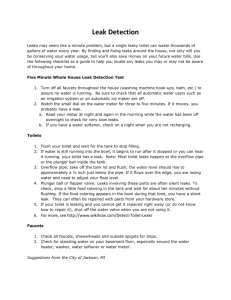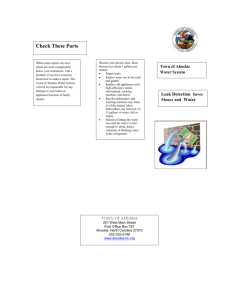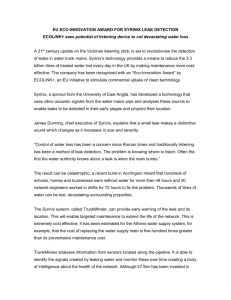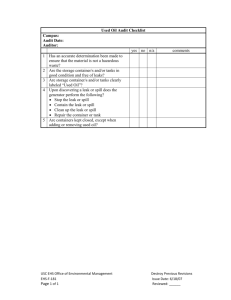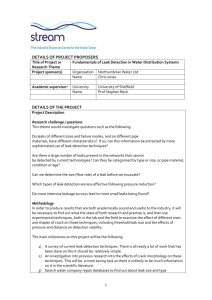Water leak detection
advertisement
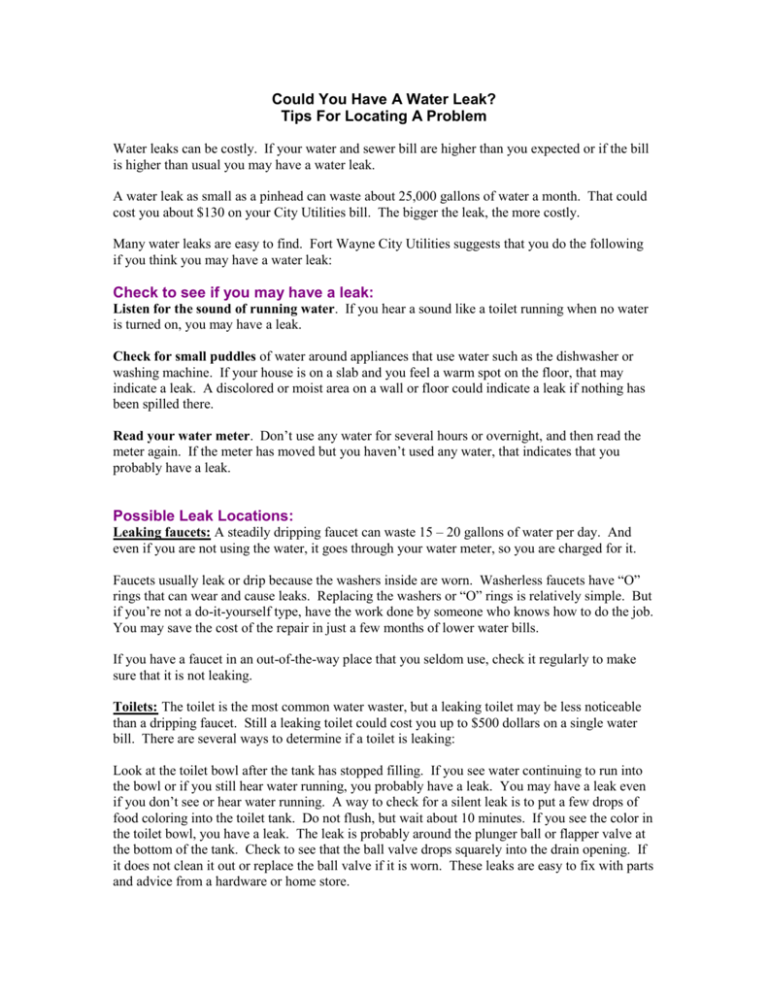
Could You Have A Water Leak? Tips For Locating A Problem Water leaks can be costly. If your water and sewer bill are higher than you expected or if the bill is higher than usual you may have a water leak. A water leak as small as a pinhead can waste about 25,000 gallons of water a month. That could cost you about $130 on your City Utilities bill. The bigger the leak, the more costly. Many water leaks are easy to find. Fort Wayne City Utilities suggests that you do the following if you think you may have a water leak: Check to see if you may have a leak: Listen for the sound of running water. If you hear a sound like a toilet running when no water is turned on, you may have a leak. Check for small puddles of water around appliances that use water such as the dishwasher or washing machine. If your house is on a slab and you feel a warm spot on the floor, that may indicate a leak. A discolored or moist area on a wall or floor could indicate a leak if nothing has been spilled there. Read your water meter. Don’t use any water for several hours or overnight, and then read the meter again. If the meter has moved but you haven’t used any water, that indicates that you probably have a leak. Possible Leak Locations: Leaking faucets: A steadily dripping faucet can waste 15 – 20 gallons of water per day. And even if you are not using the water, it goes through your water meter, so you are charged for it. Faucets usually leak or drip because the washers inside are worn. Washerless faucets have “O” rings that can wear and cause leaks. Replacing the washers or “O” rings is relatively simple. But if you’re not a do-it-yourself type, have the work done by someone who knows how to do the job. You may save the cost of the repair in just a few months of lower water bills. If you have a faucet in an out-of-the-way place that you seldom use, check it regularly to make sure that it is not leaking. Toilets: The toilet is the most common water waster, but a leaking toilet may be less noticeable than a dripping faucet. Still a leaking toilet could cost you up to $500 dollars on a single water bill. There are several ways to determine if a toilet is leaking: Look at the toilet bowl after the tank has stopped filling. If you see water continuing to run into the bowl or if you still hear water running, you probably have a leak. You may have a leak even if you don’t see or hear water running. A way to check for a silent leak is to put a few drops of food coloring into the toilet tank. Do not flush, but wait about 10 minutes. If you see the color in the toilet bowl, you have a leak. The leak is probably around the plunger ball or flapper valve at the bottom of the tank. Check to see that the ball valve drops squarely into the drain opening. If it does not clean it out or replace the ball valve if it is worn. These leaks are easy to fix with parts and advice from a hardware or home store. Many toilet leaks occur at the overflow pipe. To locate a leak, remove the lid form the toilet tank and flush. When the tank refills, the water should come up to about an inch below the overflow pipe. If water goes into the overflow pipe, you are wasting water. You can adjust the water level in the tank by adjusting the float level using the screw that attaches it to the overflow pipe. The level of the float determines how high the water gets before the valve shuts off water going into the tank. If adjusting the float level does not help you may have a leaking valve and you may need a plumber to fix it. If the overflow pipe is cracked you are losing water and the pipe should be replaced. Outside taps: Check outside taps to see if they are running or dripping. If the tap is leaking, it may need to have washers replaced. If you have left a hose running even a bit, you can waste thousands of gallons of water over the summer. Remember to turn off faucets tightly. Broken pipes: Broken pipes may be difficult to find especially if your pipes are located in a crawl space or within walls. Look for unexplained wet areas or water stains on walls. Broken pipes of leaking joints typically require a plumber to fix. Water heater: Check around you water heater to make sure it is not leaking. If you find water around the appliance you may have a leak from the drain faucet at the bottom or the top may have come unsealed. If you have a high water bill and you are certain that you do not have a water leak, you may ask City Utilities to investigate by calling 427-1234. City Utilities will investigate to verify that your water meter is working properly. As a courtesy, City Utilities may help you identify leaks or plumbing problems, but ultimately it is your responsibility to identify and repair all plumbing problems. City Utilities may charge a service charge for an investigation and generally City Utilities will only conduct a high bill investigation once in a twelve month period with no charge to the customer.
